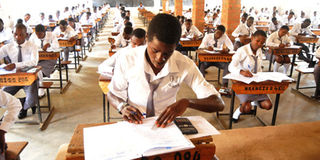Scrap A-Level, scholar advises government

Calls for review. Students sit for Uganda Advanced Certificate Examinations in 2017. FILE PHOTO
What you need to know:
- Ministry of Education statistics show that 1.7million joined Primary One in 2005 and only 534,933 sat Primary Leaving Examinations in 2011.
- The proposed 8-4-4 system would be similar to the education model in Kenya
Kampala. A Ugandan scholar has urged government to scrap the two-year Advanced Level secondary education, calling it a “waste of resources.”
Prof A.B. K. Kasozi, the former National Council for Higher Education (NCHE) executive director, proposed that the current seven-year primary education be adjusted to eight years, and students transition to university after completing the four-year Ordinary Level secondary education.
The proposed 8-4-4 system would be similar to the education model in Kenya.
“There is a massive wastage of students through “failures” to pass examinations in P7, S4 and after the unnecessary two years of “Advanced” Levels. As a result, higher education gets fewer numbers. The alarming wastage at lower levels affects tertiary enrolment,” Prof Kasozi said yesterday in his keynote address during a North Carolina State University and East Africa higher education institutions summit at Makerere University.
The day’s theme was ‘Research, teaching and engagement in the East Africa sub-region: Agenda for building communities for resilience.’
In a separate interview, Prof Kasozi told Daily Monitor that while the current education system emphasises teaching of science disciplines at O-Level, it does not translate into those who continue with it at A-Level.
“A-Level is a waste of time. It leads to massive dropout. It erodes the country of potential scientists. It wastes a lot of time because most of that could be learnt in first year in universities. I propose that we do just Senior Four and directly join university for four years. Then the universities will have more scientists, more students,” he said.
Prof Barnabas Nawangwe, the Makerere Vice Chancellor, agreed with Prof Kasozi, saying many students do not continue with science-based subjects in institutions of higher learning.
“I had never looked at it from that point. I think his argument is valid. We need to debate it and adopt the model. Many students take easier subjects. They opt out of the sciences yet government has invested heavily in teacher training, recruitment and equipping laboratories. We end up getting few students at university,” Prof Nawangwe said.
However, Mr Aggrey Kibenge, the Ministry of Education Undersecretary, said the proposal will require a policy shift which has to be discussed with various stakeholders before it can be considered.
“If it is to be taken up by the ministry, it has to be discussed and we come up with a position. It is too early to give a position on somebody’s proposal who is experienced in education issues,” Mr Kibenge said.
Mr Patrick Kaboyo, the secretary to Federation of Non State Education Institutions, an umbrella organisation that brings all private schools together, said there is need to review the entire education system to find out where the gaps are to reach the right solutions.
He said for every education level, there are core values that are emphasised. For example, Mr Kaboyo said while primary looks at developing one’s literacy and numeracy skills, secondary looks at problem solving, tertiary looks at competence and skills as the university focuses on research and innovation.
“That is the challenge we have with our systems. When people are in privileged positions, they are shy to make candid proposals that can make a shift and cause a difference. We can’t say A-Level should be scrapped without looking at the whole education system. We all know that majority of our students, especially in primary are weak and yet that is the foundation,” Mr Kaboyo said.
Ministry of Education statistics show that 1.7million joined Primary One in 2005 and only 534,933 sat Primary Leaving Examinations in 2011.
Of these, only 310,530 students transited to secondary and sat Senior Four in 2015 while the numbers dropped further in 2017 with 100,066 sitting Uganda Advanced Certificate of Education in 2017.
This shows a 94 per cent dropout rate of students who leave the system without completing the cycle from the time they start school in primary.



